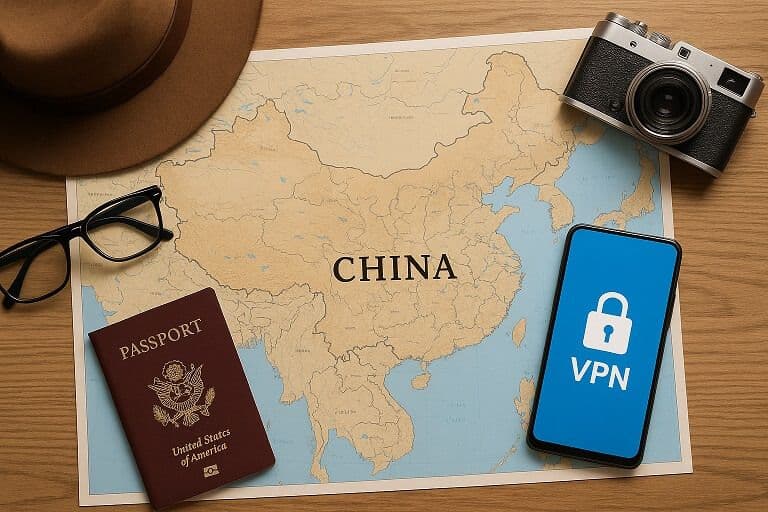Can Tourists Use VPNs in China? Everything You Need to Know
Published 2025-10-16 19:37 in Travel
Visiting China can be an incredible experience — from exploring ancient temples to tasting authentic dim sum. But there’s one thing that surprises many travelers: the internet works very differently there.
Platforms like Google, Facebook, Instagram, WhatsApp, and YouTube are all blocked by China’s Great Firewall. That’s why most travelers start asking, “Can tourists use VPNs in China?” Let’s break down the legal situation, technical challenges, and best solutions to stay connected safely while visiting China.
What Is a VPN and Why Do Tourists Need It in China?
A VPN (Virtual Private Network) encrypts your internet connection and routes it through secure servers in other countries. This lets you:
- Access blocked websites like Google, Gmail, and WhatsApp
- Stream your favorite shows while abroad
- Protect your personal data on public Wi-Fi networks
- Maintain online privacy and anonymity
For tourists in China, VPNs are more than just convenience — they’re often the only way to access familiar digital services.

Is It Legal to Use a VPN in China?
The legality of VPN use in China isn’t black and white. Officially, only government-approved VPNs are legal. These are typically used by corporations for internal communications, not by individuals.
However, in practice, millions of expats and tourists use VPNs daily without facing penalties. The Chinese government mainly targets unauthorized VPN providers, not individual users. That said, using a VPN still violates local internet regulations, so it’s wise to be discreet and responsible.
Will My VPN Work Once I Arrive in China?
Here’s the tricky part — many VPNs stop working in China. The government continuously updates its censorship technology, blocking servers and VPN protocols.
Key tip:
Download and install your VPN before you enter China.
Once you’re inside the country, the app stores and many VPN websites are blocked, making setup extremely difficult.
Even when installed, VPN speed and reliability can fluctuate. That’s why choosing a provider with strong obfuscation features (which hide VPN traffic) is essential.
What to Look for in a VPN for China
When choosing a VPN for travel to China, focus on:
- Stealth or obfuscated servers (to bypass detection)
- Nearby server locations in Hong Kong, Japan, or Singapore
- Strong encryption and a no-logs policy
- Consistent uptime and fast connection speeds
- 24/7 customer support
Not all VPNs invest in technology to overcome China’s Great Firewall — so reviews and real-world performance matter more than marketing claims.
PrivateVPN: A Traveler-Friendly VPN That Works in China
One VPN service consistently praised by travelers is PrivateVPN.
PrivateVPN offers strong encryption, stealth mode (obfuscation), and servers optimized for use in restrictive regions. These features make it one of the few VPNs that can still bypass the Great Firewall reliably in 2025.
Travelers appreciate its:
- Ease of use — perfect for beginners
- High-speed connections for streaming and browsing
- Affordable short-term plans — great for vacation use
- Privacy-first design with a strict no-logs policy
While no VPN can guarantee flawless access in China, PrivateVPN has built a solid reputation for reliability and security among tourists and expats alike.
Final Thoughts
So, can tourists use VPNs in China? Yes - but proceed with caution.
VPNs are a gray area in China: widely used but officially restricted. To stay safe and connected, download your VPN before you arrive, and choose a service that has proven its effectiveness against China’s advanced censorship systems — such as PrivateVPN.
With the right preparation, you’ll enjoy your trip without losing touch with the outside world.